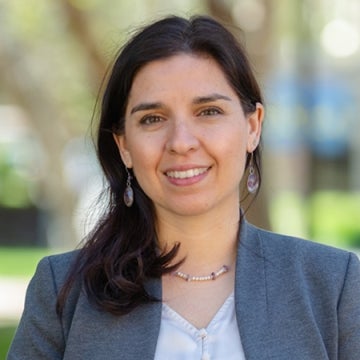
Fernanda Bravo
- Data Analytics
- Health Care
- Operations Management
Biography
Fernanda Bravo joined the UCLA Anderson faculty in 2015. Her primary research goal is to inform health care policy and decision making using contracting theory and operations management modeling.
“I focus most on three dimensions,” she says: “Designing health care policy to align incentives; fostering health care innovation through market design; and supporting decision making within health systems via data-driven models.”
These areas are crucial to the long-term success of health care reform in the U.S. because they improve efficiency and patient health. Yet they involve subtle and counterintuitive interactions: Poorly designed policies aimed at reducing hospital inefficiencies can inadvertently incentivize physicians to provide lower levels of care, which hurts patients. Over-regulating drug development to ensure patient safety might unintentionally stifle technological innovation and deprive patients from treatments. Bravo examines these subtle effects by combining elements of game theory, queuing theory, optimization and machine learning to quantify and characterize the most critical trade-offs. The insights derived from her research can guide policymakers and private stakeholders in contracting for services, promoting new medical innovations and allocating scarce resources.
At Anderson, Bravo teaches operations and technology management to MBAs and FEMBAs, as well as an elective in health care analytics for MSBA students and a Ph.D. course in supply chain contracting. Having worked with professionals at every level of the organization at Boston-area Children’s Hospital, Beth Israel Deaconess Medical Center and Partners Healthcare and UCLA Health, she brings her experience interacting with providers and health care networks to the classroom. “Health care an interesting sector. It’s a highly regulated industry and patients’ well-being is the priority. It’s different from the standard manufacturing and service industries because you have to consider policymakers, industry incentives, the population and providers themselves, and put all those perspectives into in the mix to figure out how we can do things differently, how we can deliver care better.” The opportunity to teach a class using examples meaningful to all the students’ day-to-day lives increases when the topic is health care delivery and management. “We have all been a patient at some point in our life,” she says. “Everybody has experienced some kind of inefficiency. The management of health care delivery systems, health organizations and policy-focused institutions affects everybody, not just providers.”
Bravo’s other research streams include the design and management of shared mobility systems, such as bike or scooter shares, and the use of machine learning for model analysis. A challenging problem faced by shared urban mobility systems is how to manage resources to match short and long-term supply and demand. “My goal is to improve system performance while ensuring the long-term availability of resources and to improve welfare.” In the second stream, she and her collaborators propose to design machine learning-driven frameworks for discovering structural properties of mathematical models — for example, dynamic programs and queuing models. “With the abundance of data and computational power today we can solve larger and more complex mathematical models than ever before,” she says. “However, making sense of solutions remains a challenge.” This work adds a tool that researchers can use for deriving interpretable solutions to complex mathematical models.
Education
Ph.D. Operations Management, 2015, Sloan School of Management, Massachusetts Institute of Technology
M.S. Operations Management, 2009, Universidad de Chile, Santiago, Chile
Professional Degree Industrial Engineering, 2009, Universidad de Chile, Santiago, Chile
B.S. Industrial Engineering, 2007, Universidad de Chile, Santiago, Chile
B.S. Biotechnology Engineering, 2006, Universidad de Chile, Santiago, Chile
Published Papers
Adida, E. and F. Bravo (2023) Primary Care First initiative: impact on care delivery and outcomes. Manufacturing and Service Operations Management.
Bravo F., Levi R., Perakis G., G. Romero. (2023) Care coordination for healthcare referrals under a shared-savings program. Production and Operations Management.
Bravo F., Braun M., Farias V., Levi, R., Lynch, C., Tumolo, J., R. White (2021) Optimization-driven framework to understand healthcare networks cost and resource allocation. Health Care Management Science.
Corcoran, T., Bravo F., E. Long (2020). Flexible drug approval policies. Manufacturing & Service Operations Management.
Bravo F. and Y. Shaposhnik (2019). Mining optimal policies: A pattern recognition approach to model analysis. INFORMS Journal on Optimization.
Adida, E. and F. Bravo (2018). Contracts for healthcare referral services. Management Science.
Bravo F., Ferrari L., Levi R., M. McManus (2015). The nature and sources of variability in pediatric surgical case duration. Paediatric Anaesthesia. doi: 10.1111/pan.12709
Bravo F., Dur_an G., Lucena A., Marenco J., Mor_an D., A.Weintraub. Mathematical models for optimizing production chain planning in salmon farming. International Transactions in Operational Research 20.5 (2013): 731-766..
Hernandez P., Alonso-Ayuso A., Bravo F., Escudero L., Guignard M., Marianov V., A. Weintraub. A branch-and-cluster coordination scheme for selecting prison facility sites under uncertainty. Computers & Operations Research 39.9 (2012): 2232-2241.

The Way the FDA Approves Vaccines Should Be Different Now
As Fernanda Bravo tells Warren Olney, it should be risk versus reward.
Featuring: Fernanda Bravo, Assistant Professor of Decisions, Operations and Technology Management